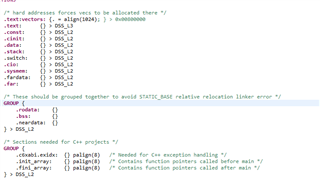Hello,
I need to allocate heap memory during program runtime.
For that reason I use LAST() function in linker MEMORY section on c66 core. But when I define this for example:
DSS_L2: ORIGIN = 0x800000 , LENGTH = 0x60000 LAST(last_dss_l2)
I get output
line 58: error #10025-D: invalid memory attribute specifier: "last_dss_l2"
"../linker.cmd", line 58: error #10079-D: origin not specified for memory range LAST
"../linker.cmd", line 58: error #10080-D: length not specified for memory range LAST
The same exact code works perfectly fine on r5f. As far as I understand from compiler/linker documentation I can use LAST both for c66 and r5f, can't I?
Thank you in advance for response, Ivan K.


